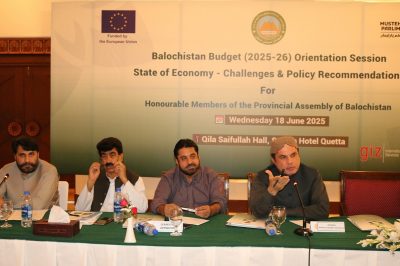
Pakistan Institute for Parliamentary Services (PIPS), with the support of the European Union funded Mustehkam Parlimaan (MuP) project successfully organized a one-day post-budget Seminar on State of Economy-Challenges & Policy Recommendation for the Honourable Members of the Provincial Assembly of Balochistan on Wednesday, June 18, 2025 at Serena Hotel, Quetta. Around 70 participants including 25 MPAs attended the event.
The event commenced with the recitation of Holy Quran by Mr. Shah Fahad. Mr. Taj Muhammad Deputy Director PIPS moderated the session. Mir Shahi Mazar Baloch, Director General (Administration) PIPS presented the welcome remarks. On behalf of Executive Director, PIPS Mr. Baloch welcomed the Speaker, Deputy Speaker, and Member of the Balochistan Assembly, expressing gratitude to the Secretary and MuP team for their support. He emphasized the historic connection between budgeting and democracy, rooted in the Magna Carta and major revolutions.
The event comprised four sessions facilitated by subject experts. In the first session, Mr. Tahir Shah Kakar, Secretary of the Balochistan Assembly, explained the budget procedures outlined in the Rules of Business of the Balochistan Assembly. He also discussed the constitutional and procedural framework that guides the budgeting process in the Province, emphasizing the necessity of legislative oversight and the role and timetable of the standing committees on budget. His detailed briefing helped Members of the Balochistan Assembly gain a clearer understanding of their roles in monitoring and shaping fiscal policy, ultimately promoting transparency and good governance.
In the second session, Mr. Aizaz Asif, Acting Team Leader and Senior Advisor on PFM, emphasized the importance of fiscal oversight and the legislators’ role in ensuring accountability, transparency, and efficient use of public funds. He identified common budgetary loopholes and stressed evidence-based audits, timely budget implementation, and audit reviews. Mr. Aizaz, through his presentation of practical suggestions and international best practices, sought to enhance the Assembly’s ability to effectively oversee state spending and ensure fiscal discipline in Balochistan.
In third session, Dr. Wasim Shahid Malik presented a clear overview of Pakistan’s economic challenges and opportunities in the context of the 2025–26 budget. He highlighted inflation, fiscal deficits, and the need for structural reforms, offering valuable insights for Balochistan’s lawmakers to make informed, development-focused budget decisions.
Following this,an in-depth discussion on the Balochistan Budget 2025-26 was carried out by Mr. Ahsan Achakzai, Assistant Professor in BUITEMS. He highlighted key economic challenges such as low development spending, limited revenue generation, and regional disparities. He emphasized the need for better fiscal planning, evidence-based policies, and equitable resource distribution to address Balochistan’s socio-economic issues.